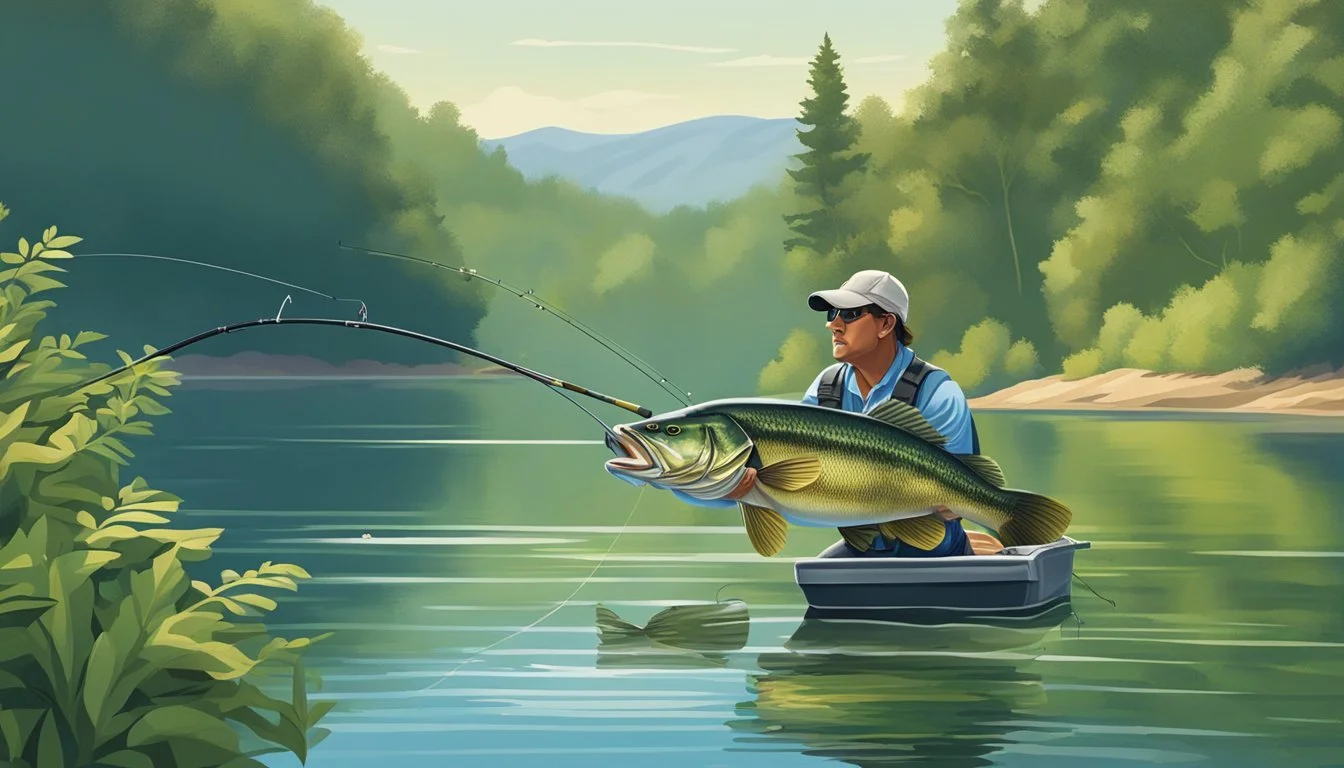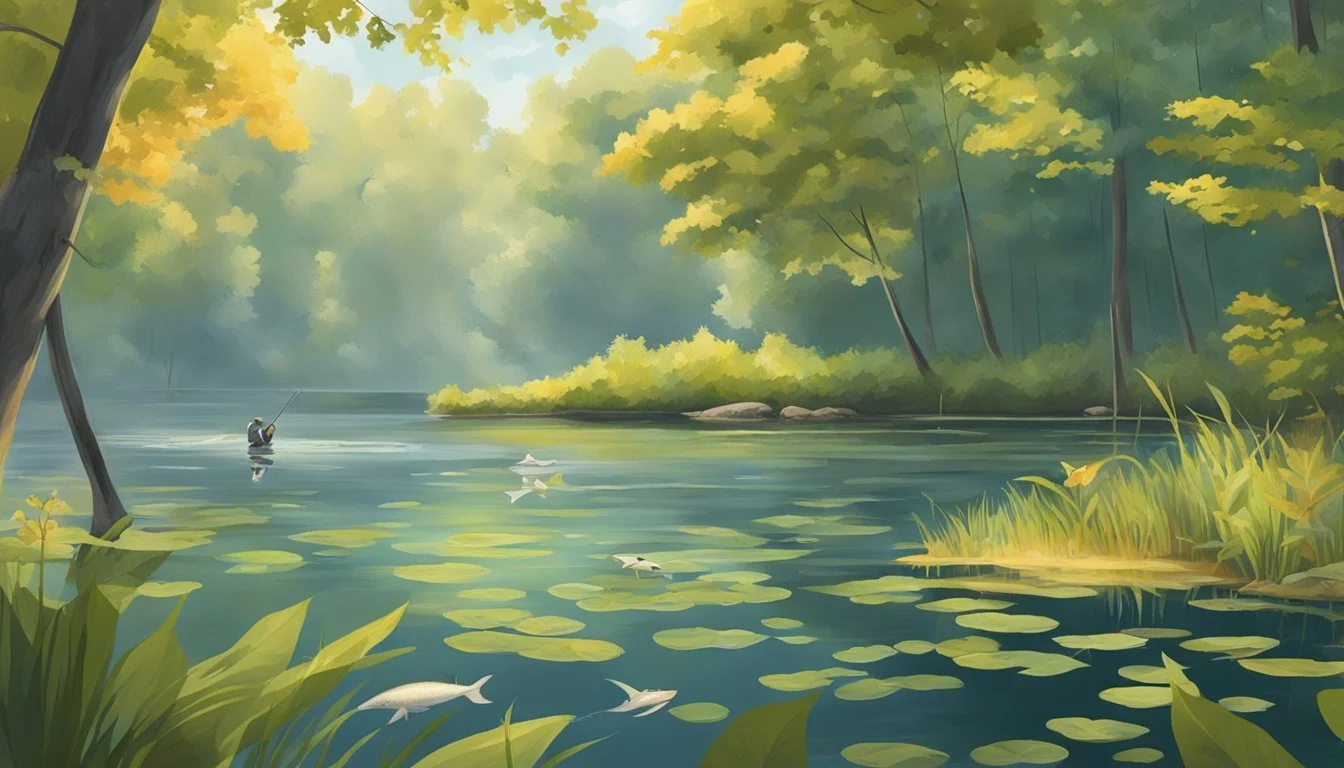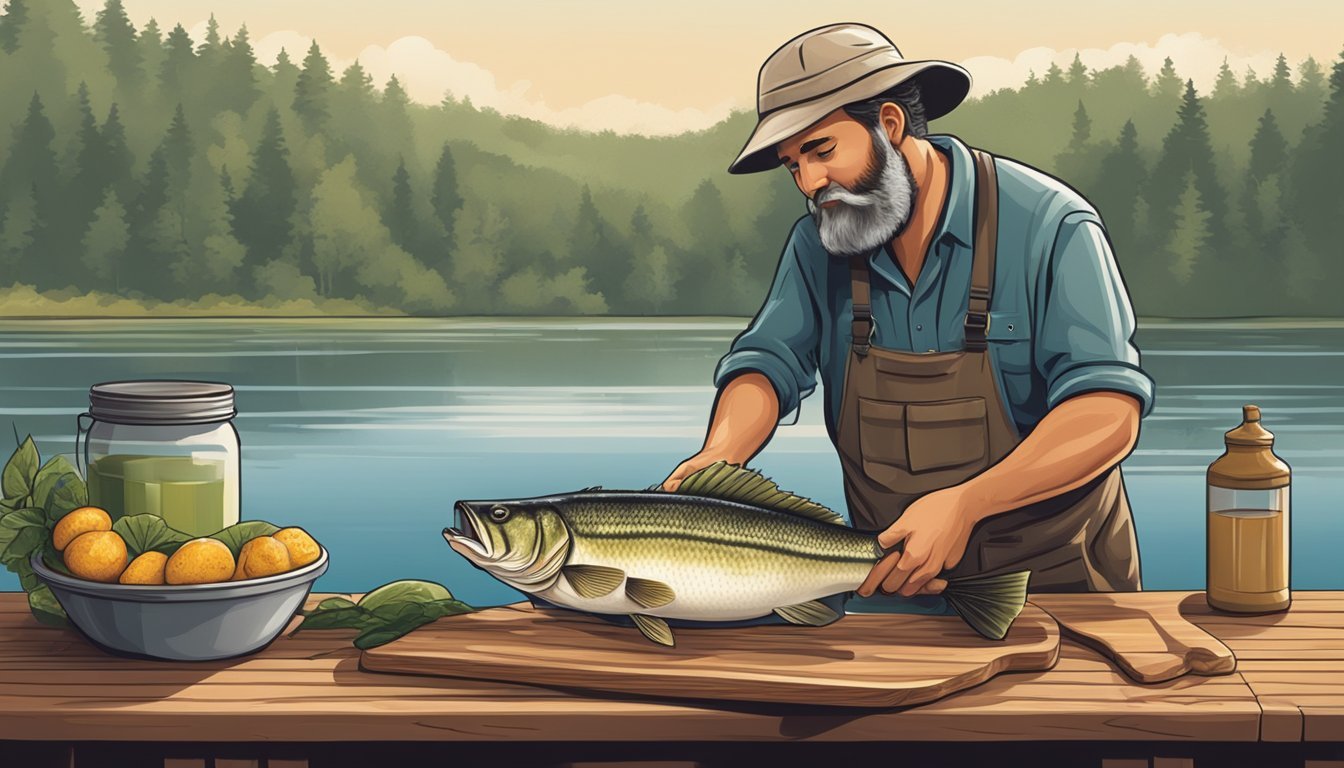Best Fish to Catch and Eat in Georgia
Top Tasty Picks for Anglers
Georgia offers a diverse range of freshwater and saltwater fishing opportunities for anglers looking to land a great catch that's also good for a meal. The state's many lakes, rivers, and coastal areas are home to a variety of fish (What wine goes well with fish?) species that provide both a challenge for fishermen and a delicious reward for the dinner table. From the rushing streams in the North Georgia mountains, which are prime spots for trout, to the vast coastal waters teeming with sea trout and redfish, Georgia is a place where both novice and experienced anglers can find their next big catch.
The waters of Georgia are rich with different species of bass, making it a haven for those pursuing these popular game fish. Largemouth and smallmouth bass are plentiful, along with their cousins the spotted, redeye, Suwannee, and shoal bass. Each species offers a unique fishing experience and a tasty option for those who wish to cook their catch. Besides bass, the state's freshwater environments also boast ample populations of crappie, catfish, and striped bass, all of which are excellent choices for anglers who appreciate a good meal post-catch.
In addition to its freshwater bounty, Georgia's coastal fisheries provide a different kind of fishing outing with an equally rewarding culinary payoff. Sea trout and redfish are among the highly sought-after species in the coastal waters, especially during optimal conditions such as a falling tide at daybreak and moderate moon phases. These fish not only test the skill of the angler but also offer a delectable taste when prepared. With an emphasis on sustainable fishing practices and adherence to state regulations, fishing in Georgia provides not only a diverse and enjoyable experience but also contributes to the conservation of these valuable aquatic resources for future generations.
Popular Freshwater Fish in Georgia
Georgia offers a diversity of freshwater angling opportunities in its lakes and rivers, with species ranging from the renowned largemouth bass to various catfish and crappie, as well as an assortment of trout.
Largemouth Bass
The largemouth bass (Micropterus salmoides) is not only Georgia's state fish but also a prominent game fish across North America. In Georgia, anglers can find them in abundance in lakes like Seminole and Hartwell. This species is noted for its spirited fight and widely sought after for sport fishing.
Catfish Varieties
Georgia's freshwater habitats are home to several catfish species, including the popular channel catfish. They thrive in both rivers and lakes, providing excellent fishing opportunities for both experienced anglers and novices. Catfish are known for their taste and are a favorite among those who enjoy fishing for a meal.
Black and White Crappie
Crappie fishing is a favorite pastime in Georgia, with both black crappie and white crappie being common targets. They are particularly abundant in the state's reservoirs, where they are often pursued for their delicate and flavorful flesh. Spring is the best season to catch them as they move to shallower waters to spawn.
Trout Species in Georgia Waters
Georgia waters are stocked with various trout species, such as rainbow trout, brown trout, and brook trout, providing year-round fishing opportunities. The 'Hooch, also known as the Chattahoochee River, is celebrated for its excellent trout fishing, particularly for anglers interested in fly fishing. These trout species offer both a challenge for catch-and-release anglers and a delightful culinary experience for those looking to cook their catch.
Georgia's Top Fishing Locations
Georgia's abundant freshwater bodies and sprawling coastline offer diverse fishing opportunities. Anglers can expect rewarding catches ranging from freshwater bass to saltwater tarpon.
Lake Lanier
Lake Lanier stands out for its reputation in bass fishing. Bass anglers find this reservoir ideal, and it is also managed by the U.S. Army Corps of Engineers, enhancing its appeal. The vast 38,000-acre lake also stocks other species, providing a varied fishing adventure.
Lake Seminole
At the intersection of Georgia, Florida, and Alabama, Lake Seminole is celebrated for its largemouth bass fishing. This lake spans approximately 37,500 acres and hosts vibrant ecosystems, making it a thrilling destination for anglers.
Clarks Hill Lake
Clarks Hill Lake, also known as Lake Strom Thurmond, offers the best overall bass fishing experience in Georgia. The lake's extensive size, over 71,000 acres, makes it the largest in the state, harboring trophy bass and other fish species throughout the year.
Chattahoochee River
The Chattahoochee River flows through Georgia and is a hotspot for trout fishing. This river is perfect for fly fishing, where clear waters and scenic surroundings complement the angling experience. Urban stretches in Atlanta provide unexpected fishing retreats as well.
Altamaha River
The Altamaha River is a go-to for a plethora of species, including largemouth bass and catfish. As Georgia's largest river, it also offers a chance to catch bull redfish, enhancing its status as a diverse fishing destination. Stretching for over 140 miles, it supports a rich biotic community.
Fishing Techniques and Bait Selection
Selecting the right fishing techniques and bait is crucial for a successful catch. Different species of fish in Georgia respond well to different approaches and baits, so understanding these preferences is key.
Live Bait vs Artificial Lures
Live bait tends to be highly effective for a variety of fish species, as it naturally attracts fish through movement and scent. Common live baits used in Georgia include:
Minnows: Versatile and effective for bass and trout.
Worms: Excellent choice for many freshwater fish species.
Artificial lures, on the other hand, are convenient and available in a wide range of options that mimic live prey. They are particularly useful when targeting species like bass. Lure selection often includes:
Crankbaits: Good for depths and structures where bass are likely to hide.
Spinnerbaits: Excellent for stained or murky water to create vibration and flash.
Fly Fishing Strategies
Fly fishing requires precise techniques and knowledge of river locations and fish feeding patterns. Successful fly anglers in Georgia often:
Use flies that resemble local insects or baitfish.
Focus on the speed and rhythm of the cast to land flies where fish are feeding.
Spinning Tactics
Spinning gear is popular for its simplicity and effectiveness, using a combination of lures and retrieves to catch a range of species. Anglers should:
Adjust the retrieval speed to suit the target fish's activity level.
Experiment with different lure weights and designs to cover various water depths.
Whether using live bait or lures, anglers in Georgia can maximize their fishing opportunities by tailoring their techniques to the species they seek.
Saltwater Fishing in Georgia
Georgia's coast offers an array of sought-after saltwater fish that attract both novice and seasoned anglers. From the adrenaline-rush of hooking a tarpon to the satisfaction of reeling in a flounder, the Atlantic coastline provides diverse fishing opportunities.
Coastal Fish Species
The pristine waters of the Georgia coast host a variety of saltwater fish species that are not only a joy to catch but also excellent table fare. Tarpon is often targeted for their spectacular fight, while redfish and spotted seatrout are popular for their delicious taste. Snapper and grouper are other favorites, known for their firmer flesh and suitability for a range of culinary preparations.
Tarpon: Acrobatic and powerful
Redfish: Strong and flavorful
Spotted Seatrout: Prolific and tasty
Snapper: Firm and mild
Grouper: Hearty and versatile
Shore Fishing Hotspots
The Golden Isles, which include areas such as Jekyll Island, provide ample shore fishing spots for anglers looking to cast a line from land. Redbird Creek, Cane Patch Creek, and Buckhead Creek are notable locations where fishers can expect success.
Jekyll Island: Diverse habitats, high potential for various species
Redbird Creek: Accessible and fish-rich waters
Cane Patch Creek: Quiet and abundant with local fish
Buckhead Creek: Favored by locals for consistency
Charter Boat and Pier Fishing
Those who prefer a more guided fishing experience can opt for a charter boat fishing adventure, where experts like Capt. David Newlin share their extensive knowledge. These excursions often lead to fruitful catches. Pier fishing is another popular method, with piers along the coast, such as the one at Saint Simons Island, providing excellent opportunities to land fish such as flounder, known to fight with tenacity.
Charter Boat Fishing: Expert-led, equipped for larger catches
Pier Fishing: Community-centric, ideal for anglers without boats
Utilizing different techniques and local expertise, anglers in Georgia can enjoy a rewarding saltwater fishing experience on its coast, replete with a variety of prime fish species ready to be caught and savored.
Seasons and Water Conditions
Successful fishing in Georgia is greatly influenced by understanding the best seasons to fish, recognizing the impacts of water temperatures, and being aware of how vegetation and pH levels affect water quality.
Best Seasons for Fishing
In Georgia, fishing seasons vary depending on the desired species. Redfish are more active and commonly caught during the winter, spring, and fall months, especially in the mornings. Tarpon fishing peaks in the summer, specifically from July to September. For Trout enthusiasts, March through October is prime time, as Georgia stocks over one million Trout across its freshwater streams annually.
Understanding Water Temperatures
Water temperature plays a critical role in fish activity and distribution. Fish such as Stripers prefer cold water and are typically more active during cooler months. Anglers will find that water temperatures can drastically impact fishing success, with different species favoring either warmer or colder conditions.
Effects of Vegetation and pH Levels
Vegetation in Georgia's waters provides essential habitat for fish but can also influence water pH levels and quality. A balanced level of aquatic plant life supports a healthy ecosystem. Meanwhile, water pH, a measure of acidity or alkalinity, is crucial for all species. Fish thrive in water that maintains a pH level between 6.5 and 9; outside of this range, fish can become stressed or even die, which in turn affects the fishing quality.
Georgia Fishing Regulations
In Georgia, anglers must adhere to regulations set by the Georgia Department of Natural Resources. These rules are critical to maintaining the state's aquatic ecosystems and ensuring sustainable fishing practices.
Licensing Requirements
Before casting a line in Georgia's waters, anglers need to secure a fishing license. Annual fishing licenses are available and can be purchased from the Georgia Department of Natural Resources. This requirement applies to both residents and non-residents for all public waters.
Residents: Individuals who have lived in Georgia for at least 12 months.
Non-residents: Visitors or residents of other states.
Fishing Limits and Seasons
Regulations on fishing limits and seasons are established to protect fish populations and ensure longevity of species:
Seasonal Regulations: Certain fish may only be caught during specific times of the year to prevent overfishing during spawning periods.
Bag Limits: These include daily and possession limits for various gamefish to control the number of fish that can be taken from a water body.
Example of Fishing Limits:
Species Daily Limit Notes Largemouth Bass 10 Includes Smallmouth Bass Trout 8 Additional regulations may apply in designated trout streams
Protected Species and Conservation
Conservation efforts are critical to sustaining Georgia’s fish populations:
Protected Species: Certain species are protected under state law and cannot be legally caught or kept.
Habitat Conservation: Georgia's Department of Natural Resources enforces regulations that protect habitats critical to the state fish and other aquatic life.
The Georgia Department of Natural Resources provides up-to-date information on protected species and areas with special regulations. It is the responsibility of the angler to remain informed about current conservation measures.
Preparing Your Catch
Once an angler has successfully reeled in their catch from Georgia's waters, they must handle and prepare the fish properly to ensure quality and taste. The following steps cover the essentials from cleaning to cooking that every fisherman should know.
Cleaning and Filleting
A crucial step in preparing fish is cleaning and filleting. It requires a clean work area and sharp filleting knives. Freshwater favorites like trout and crappie should be descaled with a fish scaler or the back of a knife, while saltwater species like striped bass are often skinned.
Cleaning:
Remove scales by scraping from tail to head.
Cut along the belly and remove guts.
Rinse the body cavity thoroughly.
Filleting:
Make a cut behind the gills moving downwards to the spine.
Follow the spine with the knife towards the tail.
Skin the fillet if desired by sliding the knife between the skin and flesh.
Cooking Recommendations
Each species has unique flavor profiles that pair well with different cooking methods. Here are some simple yet effective methods to highlight the natural qualities of your catch:
Striped Bass: Grill with herbs and a squeeze of lemon to enhance its robust flavor.
Crappie: Pan-fry fillets in butter with a touch of garlic until golden brown.
Trout: Bake with fresh dill and slices of orange to complement the fish's delicate taste.
Always remember to cook fish to an internal temperature of 145°F to ensure safety and retain its moisture and texture.






